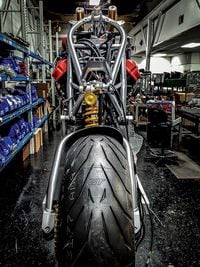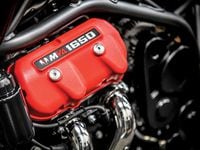Motorcyclists are a tough room. Show us what you’ve got planned and we’ll tell you what’s wrong with it. The next thing we’ll do is whine that we can’t buy it yet—until we can. Then we’ll gripe about the price.
The Motus founders make no apologies for timeline, availability, or price. They've been pushing big, fast, expensive bikes out of their Birmingham, Alabama, manufactory for two years now. With 24 active dealers, mostly near the East and West coasts, the Motus works ship a new MST or MST-R every day or two. All of them are spoken for, each destined to become a cherished heirloom for its owner.
With plans to triple its inaugural production to 300 bikes per year, Motus is working to recruit another 75 US dealers. The company is also negotiating to move into European markets. Still, if you phone down to “Motus Galactic Headquarters,” you’re likely to get a company principal on the phone.
So who buys a bespoke touring rocket that costs nearly as much as a CVO Harley-Davidson? According to Motus co-founder Lee Conn, its customers demand a bike that carries value into the future as efficiently as it schleps gear to your campsite, a bike with industrial durability and sportbike suspension, and one that just incidentally packs a king-hell engine with overdog horsepower and the torque of an armored vehicle.
Conn and co-founder Brian Case believe in their product for the same reason some dismiss Motus as yet another dream sheet full of vaporware: It took 10 years to whelp. This protracted gestation included the founders riding test mules all over the United States. They built the bike of their dreams, moved it to series production, and they’re still obsessing over it.
“Our goal,” Conn said, “is to make a superb motorcycle, full stop. Let’s look at Harley. Lots of riders love ’em, but you buy a Harley and the next thing you know, you’ve spent another $10,000 in accessories before you get out the door. Our bike is already kitted up. That’s why it starts at 30 grand.”
Some new owners come off traditional V-twins. They're looking for American durability and long-term value, coupled with lower maintenance and modern performance headroom. With 165 hp (180 in "R" form), the MST is nobody's slowpoke, and with more than 120 pound-feet of torque, its aluminum Baby Block MV4 mill is a roll-on instigator of the first order.
Other buyers are sport riders who've gradually discovered that there isn't enough ibuprofen in the tank bag to continue touring on a race replica. "Superbike" once meant a big, fast, versatile motorcycle. Now it's a euphemism for idiot-savant track toys.Buyers coming from European or Japanese touring sleds claim they're seeking a less-mediated riding experience. While Motus vehicles emphasize superb hard parts from suppliers like Öhlins, BST, Rizoma, and Brembo, they are distinctly short of digital rider aids. Traction control, wheelie control, and antilock control are managed by the rider's right hand.
“It has one riding mode,” Conn said, “and that’s ‘ride yer damn bike’ mode.”
In fact, Motus sales have been brisk at multi-line BMW dealerships, where a few iron-bearded geezers still remember finding simple, elegantly engineered bikes that could scour continents with nothing more than gasoline, a bit of oil, and the factory tool kit under the seat.
“Sport-touring has gotten very functional, with no sex appeal,” Conn observed. “The K1600 does everything it was designed to do. What it doesn’t do is whisper to you on Saturday morning that it’s time to get up and go ride.”
The production MST may look like its prototype but barely shares a part with it. After Case and Conn wrung out their prototype bikes for tens of thousands of miles, Case went back to the drawing board to make further improvements.
The upshot of that extended development phase—which, to be fair, was barely double the development cycle for a legacy OEM with established processes in place—is a durable platform with simple servicing and max development headroom.
The MV4 engine is understressed and pushrod-simple. An MST’s chrome-moly frame should stand up to anything short of extended submersion, and the balance of the bike is composed of top-shelf, conventional tackle.
The triple-sealed chain is guaranteed to last 20,000 miles whether you lube it or not. If you ever manage to wear out the rear sprocket, Motus will ship you a new one under warranty. A centerstand and eccentric rear axle adjusters make chain adjustments easy. The oil filter, which you can buy at any auto shop, spins neatly onto the front of the engine.
Conn said they designed their service plan to keep riders on the bike, not in the waiting room, using a protocol that leverages dealerships far beyond the fledgling Motus dealer network.
Under its two-year standard warranty, Motus covers warranted repairs performed at any recognized motorcycle dealership in the US. The factory ships any needed parts to the dealer, transmits any relevant service manual pages, and pays the service department its standard hourly rate.
“It’s about giving riders the best possible ownership experience,” Conn said, adding that every normal service can be performed with (you guessed it) the factory tool kit under the seat. There are no specialty tools required for regular upkeep—no factory computer, no Vulcan tricorder, no four-clawed dingle-wangle.
What services are anticipated by new Motus owners? Very few. The engine shares basic design ideas with Chevy LS V-8s, including hydraulic valve lifters with a service interval of “inspect at 100,000 miles.” Overbuilt for the long haul, it’s stuffed with forged internals and package-protected to 2.4 liters—a nearly 50-percent upsize in displacement.
Stalking Motus across rider forums reveals three rough spots that are discussed primarily by non-owners: starter motor noise, engine ring, and stiff shifting.
From our perspective, starting the MST sounds glorious. It whines like a Pratt & Whitney Wasp radial while it cranks then settles into a lumpy hot-rod idle with a background chorus of ringing.
The ringing at idle disappears under load. It comes from a spring-loaded torque compensator in the triple-plate clutch and is as distinctly characteristic of a Motus as dry clutch rattle is of traditional Ducatis.
Owners report that stiff shifting smooths out after the first few thousand miles. In this rider’s experience, shifting Motus bikes with an oft-fractured left ankle presented no challenge. If you can’t shift your Motus, perhaps it’s time to consider a Subaru, which has the same lubrication schedule.
“Change the oil every 6,000 miles,” Conn advised, “and go wear out your tires. This bike is designed to be ridden and ridden hard, not polished up and parked in your living room.” This from a man who keeps multiple antique motorcycles resting comfortably on the polished oak floors of his home.
In full disclosure, there are at least a couple of Motus bikes sitting static. The MST-R bearing serial #1 sits in the Barber Motorsports Museum. Another was purchased by the recently reopened Petersen Automotive Museum. Along with Motus investor Pratt & Miller, these museums perceive history in the making.
The madmen of Motus may just be unstoppable. In 2014, Case and Conn took shakedown bikes to Bonneville, where with no modifications they secured a land-speed record apiece. Bolting license plates and lights back on, they rode the long way home to Alabama, arriving just in time to forestall domestic discord. Passion drives this company.
Conn reserves comment on future V-4 variants. “What we’ve built is a platform,” he said. “You don’t need too much imagination to see where we can go.” Motus is in its early days, and the MST remains its flagship product.
“Motus is really a motor company,” Case said. “Harley makes engines. Indian makes engines. We wanted to create the best engine for light applications, and I think we have. We’re planning to be around for a long time.”
The company is expanding further into crate-engine production for applications ranging from powersports to industrial settings. Developed in concert with Tier 1 GM supplier Katech and racing stalwart Pratt & Miller, the 140-pound Baby Block is flexible, powerful, and adaptable. Conn estimates that a naturally aspirated 500 hp can be produced from the tidy engine package. True incorrigibles like designer Case don’t stop there, of course. The naked special crouched outside his office door has a big honkin’ supercharger hanging off the side.
But it’s the production bike that will shallow your breathing and make you rethink your entire life’s priorities. Motus’ clearest shot at history may be actualizing a new, competitive American brand, but in 10 years it could also be recognized as the marque that reimagined aspirational motorcycling.
A century from now, it might even be seen as America’s motorcycle company. That would be a nifty trick, but then so was building a series production motorcycle to heirloom standards out of four beers and a napkin sketch. Building a viable motorcycle manufacturing company, from supply chains to dealer networks to payroll to warranty service, is an even rarer trick. Currently selling bikes almost as fast as they can bolt them together, Motus owns that achievement.
“Trends fade,” Case said, then paused.
“Motus is not a trend,” Conn said. “Motus is about getting back to that feeling we all remember where you just want to get on your bike and ride that thing all over. Nothing too complicated, just a great platform with killer torque and unbelievable response everywhere.”
If you’re a gentleman of a certain age, Motus just called your bluff. It’s built a bike with brutal American power, decent comfort, roomy luggage, prestige-level fitments, solid warranty coverage, and chipper road manners. Its bike requires less maintenance than the average lawnmower. Count up your kid’s college expenses, divide by four, and tell ’em they’re on their own for senior year. There’s your budget.
Like a Patek Philippe chronograph in a world awash with plastic Casios, the MST is built to be passed along to your heirs in fine running order. Rangy, well-finished, comfortable, and swift, the Motus MST won’t override the impulses emanating from your helmet. It will communicate those directly to the pavement, mediated solely by your skills.
If you’re ready for that, Motus is building you a bike right now.
Learn More About Motus at motusmotorcycles.com

















/cloudfront-us-east-1.images.arcpublishing.com/octane/2WF3SCE3NFBQXLDNJM7KMXA45E.jpg)
/cloudfront-us-east-1.images.arcpublishing.com/octane/G4MG6OUCJNBSHIS2MVVOTPX65E.jpg)
/cloudfront-us-east-1.images.arcpublishing.com/octane/IIGGWFOTOJGB7DB6DGBXCCMTDY.jpg)
/cloudfront-us-east-1.images.arcpublishing.com/octane/QSTCM6AVEZA5JJBUXNIQ3DSOF4.jpg)
/cloudfront-us-east-1.images.arcpublishing.com/octane/U4I7G625B5DMLF2DVIJDFZVV6M.jpg)
/cloudfront-us-east-1.images.arcpublishing.com/octane/B6XD6LS6IVCQPIU6HXDJSM3FHY.jpg)
/cloudfront-us-east-1.images.arcpublishing.com/octane/ICL63FEDDRDTTMINYICCEYGMDA.jpg)
/cloudfront-us-east-1.images.arcpublishing.com/octane/FCGZHQXRBZFLBAPC5SDIQLVF4I.jpg)
/cloudfront-us-east-1.images.arcpublishing.com/octane/WNOB6LDOIFFHJKPSVIWDYUGOPM.jpg)

/cloudfront-us-east-1.images.arcpublishing.com/octane/X33NU3E525ECRHXLNUJN2FTRKI.jpg)
/cloudfront-us-east-1.images.arcpublishing.com/octane/6KKT5NNL2JAVBOXMZYS5ZO76YA.jpg)
/cloudfront-us-east-1.images.arcpublishing.com/octane/J5RKG5O455GMPGQRF2OG6LRT7A.jpg)
/cloudfront-us-east-1.images.arcpublishing.com/octane/GX2CIZKQVRH2TATDM26KFG2DAE.jpg)
/cloudfront-us-east-1.images.arcpublishing.com/octane/ZWIDYSAKQZHD5BHREMQILXJCGM.jpg)
/cloudfront-us-east-1.images.arcpublishing.com/octane/CYUHJZCTSJCH3MRAQEIKXK7SCQ.jpg)
/cloudfront-us-east-1.images.arcpublishing.com/octane/LKOFINY56FCXJCANJ5M7ZDQUBY.jpg)
/cloudfront-us-east-1.images.arcpublishing.com/octane/4NBPDACMWJH63JQYJVK3QRBDZI.jpg)
/cloudfront-us-east-1.images.arcpublishing.com/octane/KKHQHRR3FJGX7H2IPU6RALMWG4.jpg)

/cloudfront-us-east-1.images.arcpublishing.com/octane/5IOFS5JAE5FOXMNA23ZRAVVYUU.jpg)
/cloudfront-us-east-1.images.arcpublishing.com/octane/CGXQ3O2VVJF7PGTYR3QICTLDLM.jpg)

/cloudfront-us-east-1.images.arcpublishing.com/octane/OQVCJOABCFC5NBEF2KIGRCV3XA.jpg)